
This review may contain spoilers
Disappointed
I had been waiting for this series ever since it was announced. The hype was huge, and I’ll admit I got carried away with it too. Domundi usually delivers shows I find enjoyable — some more, some less — so I was expecting something special. Unfortunately, this turned out to be one of the biggest disappointments I’ve had in a long time.From the very first episode, I felt something was missing: nothing truly engaging ever came through. The pacing constantly swung between rushed sequences and unnecessarily slow moments, and whenever the plot hinted at something promising, it was poorly developed, almost like a token gesture. It often felt as if the message was: “Focus only on the main couple, because they’re the real protagonists.” And yet, ironically, it was the second couple who stole the show for me.
Ramil and Paytai were, without a doubt, the best part of this series. I absolutely loved their story and followed every moment with genuine excitement, even though they were given far too little screen time. Meanwhile, the main storyline got lost in unnecessary detours and attempts to give depth to a plot that ultimately lacked logic and coherence. Even the entire tournament arc, which initially seemed to be the centerpiece, lost almost all of its value as the story went on, as if the only goal had become simply finishing the series.
The NC scenes between the main leads felt especially weak: slow, dull, and completely lacking in sensuality. They added nothing to the story and often seemed more like an obligation than a meaningful narrative choice.
The only moment that truly struck me was the march, when Jay suddenly began singing in the middle of the crowd: a powerful and moving scene. But the atmosphere was immediately broken by Khanin’s entrance. Jay is a character with great potential, and it was disappointing to see so little of him, as well as of his relationship with Calvin, which deserved much more attention.
Another major letdown was the princess. She could have added real depth and nuance to the story, yet she was reduced to little more than decoration, placed there just to fill space without any meaningful contribution to the plot.
All in all, The Next Prince felt like a wasted opportunity: a series with polished aesthetics and a capable cast, but without a coherent or engaging narrative. A real mishmash, as I once read in another review.
Was this review helpful to you?

This review may contain spoilers
I’m sharing the review I wrote in the non‑uncut version
I had been waiting for this series ever since it was announced. The hype was huge, and I’ll admit I got carried away with it too. Domundi usually delivers shows I find enjoyable — some more, some less — so I was expecting something special. Unfortunately, this turned out to be one of the biggest disappointments I’ve had in a long time.From the very first episode, I felt something was missing: nothing truly engaging ever came through. The pacing constantly swung between rushed sequences and unnecessarily slow moments, and whenever the plot hinted at something promising, it was poorly developed, almost like a token gesture. It often felt as if the message was: “Focus only on the main couple, because they’re the real protagonists.” And yet, ironically, it was the second couple who stole the show for me.
Ramil and Paytai were, without a doubt, the best part of this series. I absolutely loved their story and followed every moment with genuine excitement, even though they were given far too little screen time. Meanwhile, the main storyline got lost in unnecessary detours and attempts to give depth to a plot that ultimately lacked logic and coherence. Even the entire tournament arc, which initially seemed to be the centerpiece, lost almost all of its value as the story went on, as if the only goal had become simply finishing the series.
The NC scenes between the main leads felt especially weak: slow, dull, and completely lacking in sensuality. They added nothing to the story and often seemed more like an obligation than a meaningful narrative choice.
The only moment that truly struck me was the march, when Jay suddenly began singing in the middle of the crowd: a powerful and moving scene. But the atmosphere was immediately broken by Khanin’s entrance. Jay is a character with great potential, and it was disappointing to see so little of him, as well as of his relationship with Calvin, which deserved much more attention.
Another major letdown was the princess. She could have added real depth and nuance to the story, yet she was reduced to little more than decoration, placed there just to fill space without any meaningful contribution to the plot.
All in all, The Next Prince felt like a wasted opportunity: a series with polished aesthetics and a capable cast, but without a coherent or engaging narrative. A real mishmash, as I once read in another review.
Was this review helpful to you?
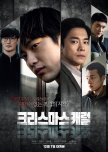
This review may contain spoilers
This is NOT a revenge movie (my opinion).
This film makes me angry, but not for the reason most people mention. It’s not the violence itself that unsettles me, nor the fact that it’s yet another dark revenge movie: it’s the illusion it carries. A Christmas Carol seems to ask me to cheer for vengeance; yet, watching it, I see something else entirely: a young man who isn’t seeking justice but is punishing himself for not being there.Park Jin-young carries the entire film on his shoulders with a double role that feels like an indictment aimed directly at the audience. On one side, he portrays the neurodivergent brother: a contracted body, uneven breathing, eyes searching for connection in a world that shuts him out. On the other, he becomes Il-woo: clenched jaw, evasive stride, hollow gaze. His brilliance lies in the smallest details — the way his posture shifts, the way his voice either drops or hardens — and in making us feel that the two brothers aren’t true opposites, but rather two poles of the same solitude.
Context matters. In Korea, anyone perceived as “different” pays a heavy price: disability, mental health struggles, being an orphan… all carry stigma. The film doesn’t turn this into an overt manifesto, but the trace is there: both brothers are already marked as losers before the story even tightens its grip. And here is what burns the most for me: I understand Il-woo’s exhaustion. Living alongside someone vulnerable can be draining; fatigue wins sometimes. But there’s a difference between fatigue and indifference. And Il-woo, as I see it, crosses that line: he stops looking, stops listening, stops being present.
SPOILER. The younger brother’s death is not “just” the result of beatings and bullying. If you watch without expecting catharsis, the film clearly shows sexual violence as the real cause. And it isn’t inflicted by the usual convenient villains, but by someone trusted — a figure Il-woo never even thinks to suspect. Here lies the decisive point: the “revenge” he pursues doesn’t arise from the truth of what happened; it comes from an attempt to numb his guilt. He cannot (or will not) see what really occurred, because he would first have to look inward and admit that he had already abandoned his brother while he was alive. If that boy had come home with bruises, I fear Il-woo would not have noticed. He had already lost him the moment he chose to turn away.
That is why I cannot read this as a “successful” revenge film. Everything that follows is pure substitution: Il-woo creates a visible enemy so he doesn’t have to face the invisible one; he turns pain into a mission because a mission provides meaning, whereas grief does not. The violence he inflicts on the world isn’t justice, it’s self-punishment disguised as action. It doesn’t “fix” anything; it simply puts distance between him and the only truth that matters: he failed to protect the one who depended on him.
The direction (cold, claustrophobic) underscores how much moral myopia pervades the story: corridors that close in, spaces that compress, a staging that pretends to breathe action but really suffocates. Even when the plot accelerates, I don’t feel release: I feel delay. Every act of retribution comes too late, aimed at the wrong target. It’s a chain of substitutions: striking what can be struck, because what must be named is untouchable — by shame, by fear, by impotence.
If I must explain why Park Jin-young’s performance feels so powerful to me, it’s also because Il-woo is never a “tragic hero.” He is a guilty figure in the most human and painful sense: he didn’t commit the violence himself, but he allowed it to happen in his absence. And when he finally acts, he does so too late and in the wrong direction. The double role becomes a merciless device: in every frame, it feels like witnessing an inner trial where both the defendant and the victim share the same face.
Those who want revenge here will find action. Those who seek the truth will find a void. And it’s that void that angers me: not because the film “offers no answers,” but because it shows the wrong answer becoming the narrative. The result is not redemption — not even effective vengeance — but a grief that can never complete itself. No balance is restored, no order returns: there remains only a boy who understands too late, too poorly, and has no idea where to put his hands.
To me, A Christmas Carol is this: not the muscular tale of someone “taking justice into his own hands,” but the confession of someone who cannot say I’m sorry to the right person at the right time. So he speaks with fists, with knives, with fury — because speaking with guilt requires a courage the film, deliberately, never grants. There is no redemption where pain was ignored before it was violated.
Seen this way, my anger makes sense. Not against the film as such — which is harsh, consistent in its chill, superbly acted — but against the comfortable idea that vengeance equals understanding. Here, nothing is understood: there is only punishment. And punishment, as we know, is never healing.
Was this review helpful to you?
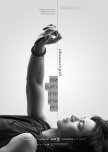
180 Degree Longitude Passes Through Us
2 people found this review helpful
This review may contain spoilers
Critical Analysis (with SPOILERS)
Capsule (spoiler-free)180 Degrees Longitude Between Us isn’t your typical love story: it’s a chamber drama about desire, grief, and responsibility. Three people confined to a house—Mol, Wang, In—and a theatrical direction (spaces, thresholds, silences) that refuses easy consolation. The series doesn’t deny feeling: it acknowledges it and then places it within ethical boundaries, choosing a coherent, adult ending. If you’re looking for wish-fulfillment, you may be taken aback; if you’re looking for emotional truth, it will be hard to shake.
SPOILER ALLERT!!!
1) What it’s really about (beyond the ship):
This series isn’t a “failed love story”; it’s a chamber drama about desire, grief, and responsibility inside a triangle of mother–son–father’s friend (Mol, Wang, In). Its form is theatrical (few characters, long scenes, use of thresholds and mirrors), a choice that forces us to sit inside the cracks of these relationships instead of anesthetizing them with editing or hand-holding music. That formal setup is the author’s statement: an intimate piece with actors mostly enclosed in interiors, dense dialogue, and a deliberately slowed tempo.
Core thesis: desire isn’t denied; it’s acknowledged and then placed within boundaries. The aim isn’t romantic gratification but to break a cycle of role confusion and inherited guilt that has everyone trapped.
2) The dangerous knot: when BL meets the ethics of boundaries:
A lot of BL fandom is trained to look for wish-fulfillment (the couple “should” end up together). Here, however, Wang/In is ethically problematic due to asymmetry (age/experience), affective position (In is the late father’s best friend, the site of unresolved grief), and a family system still collapsing in on itself. The series doesn’t demonize desire; it shows how destructive it would be to act on it while ignoring context. That’s what some “romance-first” viewers experience as frustration; in fact it’s a lesson in boundaries.
" Let’s name it clearly: consent alone isn’t enough when there is structural asymmetry (history, roles, grief). The text stages this and honors it in the ending. "
3) The three arcs—no sugarcoating:
- Wang — from enmeshment to subjectivity:
Wang enters In’s house seeking truth about his father and a place of his own in the world. His bond with Mol is enmeshed (closer to a symbiotic couple than mother–son), and the desire for In begins partly as escape from the maternal orbit and as a mirror for an idealized father. The series has him name desire, accept it, and not use it to plaster over grief. That’s maturity, not renunciation.
- In — from nostalgia to the limit:
In is the adult frozen in the past—his youthful love for Wang’s father suspended in amber. Wang and Mol shatter the sanctuary: temptation is real, the tension is palpable (the series is famous for how it crafts unconsummated tension), but In chooses the boundary. Not because he doesn’t desire, but because he understands that embracing desire and stopping is the only way not to turn it into appropriation.
- Mol — from control to letting go:
Mol concentrates power and fragility: a charismatic but controlling mother, willing to bend the family narrative rather than lose Wang. She risks being read as “the antagonist,” yet she has a true arc: she sees the unhealthy system, releases her grip, and accepts that loving a son means not owning him.
4) Why the ending is “right,” not “sad”:
Many wanted Wang and In together. The ending rejects that shortcut and chooses the correct roles: Wang exits the enmeshment, In doesn’t “inherit” the father’s place, Mol relinquishes control. No one “wins” in the rom-com sense; each heals a part. It’s an ethical ending: it acknowledges the feeling and contextualizes it; it doesn’t punish love—it centers responsibility.
5) Film language: how form makes the ethics legible:
- Space: the house is a fourth character; thresholds, frames, mirrors become visual lines that separate/approach.
- Time: long takes force us to “stay” with consequences; no anesthetizing edits, no guiding score.
- The 180-degree “line”: the title resonates with the cinematic rule; respecting the line becomes a metaphor for the boundary—you can approach, but you don’t cross. The mise-en-scène doesn’t just illustrate; it argues. Its visual grammar is what makes the final choice feel truthful.
6) Where it may rub (and why that’s intended):
- “It’s slow and talky.” True; that’s the price of ethical precision.
- “No catharsis.” There’s no applause; there’s a hard-won peace instead.
- “A BL without wish-fulfillment.” Yes—and that’s its political strength: it shows that setting a limit can be a form of love.
7) Anchor scenes:
- The first admission of desire: the text treats it as truth to honor, not a green light.
- Confrontations within the house: bodies reaching and stopping; thresholds left uncrossed.
- The farewell: not “no to love,” but yes to responsibility. All three exit the house intact.
8) Why it matters—also politically:
In a BL market that often sells immediate gratification, 180 Degrees is almost a counter-genre: it shows that placing a boundary can be a form of love. It’s a discourse on informed consent, asymmetries, grief, and respect for roles—exactly the areas where fandom sometimes prefers a fairy tale to reality. That’s what makes it—for me, and for you—one of the most honest and necessary series of recent years.
Was this review helpful to you?

This review may contain spoilers
I don't Know.
First ViewingThere are evenings when I have nothing to do. Or rather, there are things I could do, but inspiration is somewhere else — on a lunch break, maybe asleep somewhere — so I stay awake fighting insomnia, looking for something to keep me company. I usually end up watching movies: it’s an old habit, almost a reflex. When I can’t write, I watch; when I can’t feel, I look for someone else who can feel for me.
That night, while scrolling absent-mindedly through the streaming apps I use, I came across Midnight Playground. The title intrigued me, as did the cover image — dark, undefined, yet strangely magnetic. I read the brief, vague synopsis, and that was enough to make me click play. I had the feeling it would be something unusual, maybe difficult, but I thought at least I would be able to follow its meaning.
It didn’t turn out that way. I watched it once and didn’t understand it, then a second and a third time, still lost in the same confusion. The film left something behind, but I couldn’t translate it. It was as if it were telling me something I hadn’t yet learned how to hear. Refusing to give up, I started looking for information. I wanted to understand what the director meant, because what I had read in the synopsis didn’t match what I had seen. I wanted to learn to watch it the way he had imagined it — to recognize the hidden meanings behind a narrative that seemed to move like a dream.
!!!! SPOILER !!!
Midnight Playground is built like a temporal short-circuit. The two periods — 1954 and 2022 — are never clearly marked on screen with captions or color changes; instead, they overlap. That’s what makes it so disorienting. The only way to know which era you’re in is by paying attention to visual and sound details, because the film scatters them subtly, like crumbs.
In 2022, the background noises belong to a modern city: traffic, engines, distant voices, the glow of neon lights. The shots are smoother, sometimes brighter, and there’s a sense of freer movement.
In 1954, everything is quieter. The old-style streetlamps, the rougher image grain, and the feeling of tighter, more secretive space stand out. The clothes are stiffer, the tones more muted. These aren’t drastic contrasts, but small shifts that alternate and blur, creating that constant question: where am I now?
The film never names the characters in the contemporary part, but in 1954 we learn that the man is Huang Liang-sheng — the historical figure, a young gay man living in a time when he couldn’t exist openly. The other man — the one in 2022 — isn’t his descendant or reincarnation; he’s more like an echo. Both live the same experience in different moments, without ever meeting. The park is the same physical place, but it also acts as a point of contact between two lives, two solitudes.
To understand the film, you have to abandon the idea of a linear story. Midnight Playground doesn’t narrate “a” story; it shows a repetition. What happens in the present is what happened in the past, and the rain — constant in both timelines — signals that the two dimensions are speaking to each other. When the camera moves as though you were the one walking, it’s no longer clear whether you’re watching or remembering. You exist inside both eras at once.
The key to orienting yourself lies in noticing how sound, light, and distance change between people.
- In the present, distance is physical but not social: you can look, but not touch.
- In the past, it’s the opposite: closeness is forbidden, the contact fleeting and risky.
These two worlds keep mirroring each other until they fuse, and at that point the film stops asking you to understand when you are — it asks you to understand who you are in that moment.
Midnight Playground is deliberately ambiguous. It offers no answers, but builds a language of correspondences. If you stop looking for narrative logic, you begin to see that each era is just another way of telling the same loneliness.
The ending of Midnight Playground leaves many questions open. After a long sequence of hesitant movements and uncertain gazes, something sudden happens: one of the two men approaches the other aggressively, as if trying both to push him away and to hold him back. It’s a difficult moment to interpret because it’s not clear whether it comes from anger, fear, or desire.
There’s no clear indication of what’s really happening, and the film doesn’t offer explanations. Everything focuses on that tension — a contact that feels more like a confrontation than an encounter, a gesture that could be rejection just as easily as an attempt to affirm something. From that point on, the distinction between the two eras seems to dissolve. It’s no longer clear whether we’re in the present or the past, or which of the two men is acting. All that remains is the sense that something has broken and can’t be repaired.
It’s an ending that leaves you suspended. It can be read in many ways: as a reaction of fear toward something one can’t accept, as an eruption of desire that’s been repressed for too long, or as an attempt to destroy something before it becomes real. There’s no single interpretation, only multiple possibilities that make the scene both unsettling and necessary.
What remains afterward is silence. The rain keeps falling, the park returns to emptiness, and the viewer is left with the feeling that the film hasn’t really ended — that something remains suspended somewhere, like a thought that can’t quite find its words.
After watching Midnight Playground several times, I’m still left with the same feeling of uncertainty. Even now that I can distinguish the time periods, the gestures, the silences, the film never fully reveals itself. It’s as if understanding only takes you so far, and beyond that point lies something unreachable — a thought that refuses to be translated.
Perhaps that’s how it’s meant to work: not to tell, but to remain. Each viewing brings me back to the same place, only with a deeper awareness. I realize that what stays with me isn’t the story, but the way I’ve moved through it — the breathing, the rain, the fear, the need to understand, and the surrender that follows.
Midnight Playground isn’t a film to “like” or to “understand”; it’s a film to experience. The more you observe it, the clearer it becomes that its power lies in how fragile it allows itself to be — the same fragility that belongs to anyone who tries, in the dark, to exist even for a moment.
In the end, there’s no message left behind, only a presence. Something that keeps watching you even after the screen goes dark, like a memory that doesn’t belong to you, but that — for some reason — you can’t quite forget.
Was this review helpful to you?

This review may contain spoilers
Many films tell stories. Few, however, ask questions. (my opinion)
A Distant Place belongs to the latter category. And perhaps this is why so many viewers come away unsettled: they expect a linear drama, a love that either endures or breaks, a definite conclusion. But Park Kun-young chooses another path: he leaves gaps open, lets silence speak, and offers not answers but possibilities.At first, it looks almost like a pastoral dream: Jin Woo, a sheep farmer, lives in the countryside with young Seol, whom he has raised like a daughter, and with Hyun Min, his partner and lover. Their daily life is made up of small gestures, glances, quiet routines. Everything seems stable, as though distance from the city might shield them from the pressures of the outside world. But this peace is fragile, and the return of Jin Woo’s sister to reclaim the child reopens wounds that had never fully healed.
And here the questions begin. What is a family? Is it the one you’re born into, or the one you choose? Is it truly possible to protect those you love, or will life always find a way to take them from you? There is no clear answer, because each character embodies a different part of this tension. The sister who wants her daughter back is not simply an antagonist, but also a mother reclaiming her role; Hyun Min is not just a wounded lover, but a man challenging his partner’s immobility.
The film works through symbols. The little girl and the grandmother, often shown together, represent the beginning and end of life coexisting in the same space. The sheep, especially the newborn lamb at the end, symbolize birth, fragility, and hope that persists despite pain. And the farmer’s words, reminding Jin Woo of the meaning of staying, weigh against his desire to leave. Every scene suggests that life is never a single direction, but a constant oscillation between opposites: leaving or staying, holding on or letting go, belonging or separation.
Many interpret the argument between Jin Woo and Hyun Min as a definitive breakup. I don’t see it that way. There is no farewell, only hurt expressed in harsh words, as often happens in relationships when anger takes over. It isn’t an ending, it’s a suspended fracture — unresolved, left hanging. In the end, we don’t know whether Jin Woo will follow his sister with Seol, seek out Hyun Min, or remain in the countryside. What we are left with is an open ending that resolves nothing but instead hands us a question: “Where do we truly want to be, to belong — and what does that mean?”
And this is why A Distant Place became a film I loved deeply. Not because it comforts, but because it dares to leave us in uncertainty. It doesn’t narrate abandonment; it reveals the difficulty of choosing, the fear of staying, the weight of love when it isn’t enough to guarantee stability. It is a film that doesn’t shout, doesn’t explain, never fully reveals itself: it remains distant, as its title suggests, and in that distance it forces us to look inward.
This, I believe, is why many viewers expect too much and walk away disappointed: they look for certainty, closure, a moral. I instead found in its openness, its symbols, and its silences a deeper truth: life rarely provides definitive answers, only possibilities we must learn to inhabit. And A Distant Place reminds us that between leaving and staying, between attachment and absence, between birth and ending, what matters is not the answer but the question we carry with us.
Was this review helpful to you?
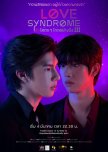
This review may contain spoilers
When Abuse Disguises Itself as Love: the Disaster of Love Syndrome III
I grew up watching movies and TV series, falling in love with stories and, over time, with the psychology behind them. I’ve always sought works capable of digging into you, disturbing enough to haunt you even after watching, to unsettle you and keep you awake at night. I’ve survived Cannibal Holocaust twice, and I know how to recognize when a story really wants to hit hard.Love Syndrome III, however, doesn’t belong to that category. It’s not disturbing, it’s not extreme, it’s not cruel. It’s simply annoying. And it is so because it does something I deeply hate: it takes violence and romanticizes it, turning it into a sick fairytale.
The annoyance I feel towards this series is the same I feel every time a story tries to convince me that “even a psychopath can fall in love if they meet the right person,” or that the victim, sooner or later, will bend until they realize that deep down they feel love for their abuser. These clichés are not only banal: they are dangerous, and Love Syndrome III is a toxic concentrate of them.
---
A necessary premise
I know this isn’t the first part of the story, and that Love Syndrome III is the third chapter of a saga, drawn precisely from the third part of the novel. After finishing it, I looked for information about the story to understand how much was different and what the author’s true intent was. From what I could gather, the author of the novel wanted to portray two equally toxic characters, two damaged individuals destroying each other. There was no “good guy” or “bad guy”: they were two sides of the same toxicity.
The series, on the other hand, chose to turn it all into a romantic melodrama, simplifying the characters and turning the dynamic not into a war between two toxicities, but into the glorification of an abusive relationship disguised as love.
For those wondering: yes, I finished the series. Not because I liked it, but because I don’t like leaving things unfinished. I never leave anything halfway: even after months or years, I always pick up what I started. For me it’s like an open door that has to be closed. And in this case, I also watched it because I trusted the recommendation of someone I know well, who knew very well how much these dynamics annoy me.
---
SPOILER RED ZONE
How the series builds dependency (not love)
The very first “thesis” of the story is stated outright: Day wants Itt to be dependent. Not “loved”: dependent. The text makes it explicit — Day spoils him, conditions him, isolates him so that “you’ll never think of leaving.” It’s behavioral programming, not tenderness. The series shows/tells us that Day takes pride in his method: making sure Itt cannot live without him. This isn’t subtext between the lines: it’s staged and discussed in the early episodes.
On a psychological level, this is conditioning: reinforcements, punishments, emotional blackmail. It’s gaslighting when useful and love bombing when convenient. It’s the deliberate construction of an emotional dependency bond (what audiences often call “Stockholm Syndrome,” though it isn’t a clinical diagnosis).
---
The amnesia device: a moral reset that absolves the abuser
Then comes the accident: Day loses his memory of the last three years, meaning his entire relationship with Itt. Dramaturgically, amnesia works like a clean slate: it erases past responsibilities, justifies new cruel treatment (“I don’t remember you”), and forces the victim to start from zero to “earn back” affection from the one who already devastated them. It’s a narrative device that shifts guilt from the abuser to fate. Yet even without memories, Day continues to react with instinctive jealousy and control: the behavior remains, but the story dresses it as “instinctive love.”
---
The perimeter of control: not only over Itt
Control doesn’t stop at the couple. The series shows Day ordering one of his men (Nan) to “discipline” Mac, Itt’s obsessive/infatuated high school friend. It’s punishment by proxy: Day uses his subordinates to police anyone orbiting Itt. Jealousy becomes management of other people’s lives, and instead of condemning it, the narrative treats it as “romantic” jealousy.
---
The crossover that doesn’t hold: Day in Unforgotten Night vs Love Syndrome III
As if that weren’t enough, the series seems to wink at a connection with Unforgotten Night. In Love Syndrome III, Kamol and Kim appear (though played by different actors), leading many viewers to wonder if the two narrative universes belong to the same world.
And here’s the shock: if the Day of Love Syndrome III were truly the same Day of Unforgotten Night, we’d face an inexplicable psychological leap. In the first context, Day doesn’t come across as hateful or irredeemably toxic, and his relationship isn’t depicted as sick. In the second, he becomes the embodiment of manipulation and romanticized violence.
The result is a narrative short-circuit: two irreconcilable versions of the same character, a discrepancy so abysmal it leaves the viewer more confused than engaged. If the intention really was to create a “BL multiverse,” the attempt only undermines the story’s coherence and credibility further.
---
“It’s not love, it’s acceptance” — staged
What the series calls “love” is, scene after scene, forced acceptance.
Itt endures insults, coldness, and emotional blackmail “because Day doesn’t remember” and because “one day he’ll go back to how he was.”
The script rewards surrender: the more Itt endures, the more the story rewards him with crumbs of tenderness.
Itt’s literal mantra is: “I have to be patient with Day.” Not “I have to care for myself,” not “I deserve respect”: patience towards abuse until it gets reframed as passion.
---
“Redemption” on command
The so-called moral turning point comes because it has to: it’s not psychological growth, it’s a genre requirement. Day apologizes, has “cute” jealous scenes, does protective gestures: the reward mechanics realign the viewer. It’s emotional engineering to normalize dependency. The result: the audience is asked to root for the “tamed bad boy” — without a true path of accountability.
---
Aesthetics that betray the artifice (yes, even the wig)
Visually, the series sabotages itself. The styling choices for Itt (the wig fans had called “horrible” since the promotion) are the perfect symbol: nothing is authentic. It’s hard to engage with trauma if the image reminds you in every frame of its artificiality. And when acting and direction swing between stiff and forced, suspension of disbelief collapses. Even genre-friendly viewers pointed out cringy performances, weak directing, and even a phony final fight.
---
Psychological anatomy (brief but sharp)
Day: behavioral profile of a coercive partner. Instills dependency (spoiling/limiting), uses jealousy and isolation, delegates punishments, then seeks absolution through amnesia/“I’ve suffered too.” It’s the grammar of the romanticized abuser: guilt dissolved in backstory, passion as an excuse.
Itt: written as a functional victim. His agency is sacrificed on the altar of “stay and wait”: he endures, self-blames, trains himself not to react. The series rewards him when he’s most compliant — and that’s the most painful part, because it teaches the audience how you get trapped in the cage.
Social system (family/friends/boss): a framework that validates. The brother believes jealousy will “trigger memories” (so jealousy = cure). The boss in love who visits “normalizes” the idea that even crime can be redeemed through romance. Henchmen carry out punishments “for love of the boss.” It’s a world telling you: endure, because love justifies everything.
---
“Why it hurts” (more than explicit cruelty)
For those who’ve lived through abuse, seeing these mechanisms glorified is a trigger. For those who haven’t, the risk is normalization: jealousy = passion, possession = protection, surrender = proof of love. The series doesn’t put violence on display to condemn it: it translates it into romantic language and feeds it to you as medicine for tender hearts. This, to me, is the gravest irresponsibility.
---
Method note (on the “facts” of the Love Syndrome world)
Within the franchise and fan discussions circulates — and the series winks at — a backstory of kidnapping/rape as the origin of Day/Itt’s bond, an element made even more explicit in the spin-off movie and novel materials. Even when the TV season tones it down or moves it to flashbacks/backstory, the point remains: the core is violent, and the story uses it as a romantic spark.
---
Technique and packaging (for fairness)
Cast & setup: Lee Long Shi (Day) and Frank Thanatsaran (Itt) lead a 2023 drama produced as a 12-episode miniseries, with amnesia as the main engine.
Writing & editing: reinforcement structure (cruelty → affection → jealousy → affection), punitive subplots (Mac/Nan) to reiterate systemic control. A finale that simulates “growth” but in fact rewards surrender.
---
Closing (no discounts)
Love Syndrome III isn’t “raw”: it’s manipulative in the worst way. It uses amnesia to wash away abuse, cross-series fanservice to legitimize universal redemption, and romantic language to teach you that suffering is proof of love.
It’s not love: it’s acceptance, dependency, annihilation.
A handbook of romanticizing abuse disguised as a love story.
Was this review helpful to you?

This review may contain spoilers
Beyond the office rom-com: guilt, responsibility, and the growth of Cher (and Gun)
- What it seems vs. what it really tells:On paper, it looks like a classic GMMTV rom-com: bubbly intern, stern CEO, glossy office. In reality, the moment the story steps outside the workplace and takes us into Cher’s past and hometown, it becomes something else: a tale of undeserved guilt, chosen responsibility, and the weight of other people’s judgment. The love story is there—and it works especially in the second half—but it’s a means, not the end.
- Cher: from “class clown” to someone who carries the weight (SPOILERS):
The emotional core is Cher’s storyline with the girl from his village he once loved, and her younger brother. Back home, many people despise him; they see him as partly responsible for a tragedy that happened to her. In truth, Cher isn’t at fault—and yet he chooses to shoulder part of the stigma to protect her younger brother, who would otherwise be crushed by it.
This choice rewrites the character: behind the chatty, sunshine persona stands someone who absorbs other people’s hate, acts as a lightning rod, and takes on burdens that aren’t his—simply to avoid leaving someone he cares about alone. That’s where the series stops being a workplace game and becomes a portrait of moral responsibility. If you focus only on the “cute couple,” you miss this—and that’s a pity, because it’s the backbone of Cher’s arc.
- Gun: control, shame, silence… and then a choice:
Gun isn’t just “the boss.” Early on, he copes with his position through control and silence: being a gay CEO in an environment full of scrutiny makes him fear judgment, hide, and keep things quiet (he even manages his insomnia with Cher’s ASMR before letting him truly into his life).
The turning point happens outside the office: when Gun follows Cher into his world, he listens, puts himself at service, and shows up for him and his family. That’s where he moves from distant superior to present partner. He doesn’t “save” Cher; he stands with him—and that difference is huge.
- The relationship: it breathes once it leaves the office:
Inside the company, their relationship is ethically thorny (boss/intern is slippery terrain no matter what). Outside, the center of gravity shifts: in the village and through family crises, they meet as equals. Cher drops the perpetual-performer act and allows himself to be vulnerable; Gun lowers his guard and learns to follow, not only lead.
Even the romantic rhythm makes sense from this angle: the steps forward and backward, the decision to pause so Cher can finish university and then come back on clear terms (“let’s be together—but not as ‘the boss and his intern’”) read as narrative coherence, not whim.
- Why the “village” plot isn’t filler:
Some dismiss it as a detour that “steals time from the couple.” I see the opposite: it gives the couple meaning.
1. It explains why Cher behaves the way he does (the smile as armor).
2. It forces Gun out of his habitat and makes him choose the person over the role.
3. It shifts the theme from romantic fantasy to everyday choice: caring, shouldering, staying even when it’s uncomfortable.
- Where the show stumbles (let’s not pretend it doesn’t):
1. Tonal whiplash: the jump from office gags to “small-town pain” is abrupt; some will find it uneven.
2. HR fantasy: the workplace boundaries are often ignored and remain unrealistic.
3. Side plots: a few corporate/office threads are weak and take oxygen away just when Cher’s personal story deserves more space.
Conclusion!!!
A Boss and a Babe isn’t “the series of the century,” but it’s far more than a fizzy rom-com. When it looks into Cher, it speaks of internalized guilt, chosen responsibility, and protection; when it looks into Gun, it speaks of social shame and the courage to show up.
If you stop at the cute office moments, you miss the point. If you accept the unevenness and look beneath the gloss, you’ll find a quietly powerful heart—and that’s what stayed with me.
Was this review helpful to you?
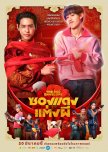
This review may contain spoilers
Adorable, almost as much as the original movie.
I didn’t watch this film so much for the story, but mainly for the two lead actors: very young, yet already capable of standing out with truly remarkable past projects. Seeing them together again was a pleasure, even though this time — unlike before — I didn’t feel the need to take their love story too seriously. In fact, the romantic side stays mostly in the background: it’s relevant to the plot, of course, but only up to a point. It’s not the beating heart of the film, and that’s perfectly fine. Overall, I don’t consider it on par with their previous performances, but it’s still an enjoyable and emotional watch. I laughed a lot, even more than with the original version — and that’s a rare thing.The ending, however, felt a bit restrained to me: it lacked that emotional peak that could have given the story more strength.
That said, I’m not a fan of constant comparisons, and I honestly think this is a successful film. If you’re looking for something light, funny, and capable of making you laugh while still offering a touch of emotion, this is definitely a great choice.
Was this review helpful to you?
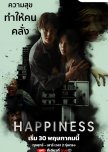
This review may contain spoilers
I started this series yesterday and finished it today.
I started this series yesterday and finished it today. That alone says a lot: I genuinely liked it! But there are also a few things I honestly didn’t enjoy at all.Let’s start with what worked: I appreciated that they didn’t stray too far from the original plot, and that they more or less followed the same sequence of events without turning the story into something completely different.
I also found that some aspects were actually easier to understand in this version: the dynamics were clearer, and certain moments stood out more.
Another good point: the focus wasn’t overly placed on the romance between the main characters, but rather on the unfolding events and rising tension. And I liked that they added little details — things that might’ve been in the original but didn’t really stand out as much.
As for the cast, I love Saint: that face of his, that way of acting that’s both a little mature and still a bit raw… I always find him charming. Orn did a great job emotionally, especially in the scenes involving her father and when she was helping the people in the building.
Petch, though, was my favorite! I had so much fun watching him. He looked perfect with those glasses, and I was so happy to see him again in a role that fit him so well. I adored him.
Now... spoiler alert!
I’m not going to talk about the lack of “chemistry” between the two leads — because really, in a situation like that, who would even be thinking about flirting? You’re in the middle of a pandemic, trying to survive. Romance isn’t exactly a priority.
What really didn’t work for me was how the main characters were written almost as exact copies of the original ones.
Run, for example, felt like a weaker version of Sae-bom. Not emotionally — Orn did convey those parts well — but in her “badass” side. It felt forced, like she was trying hard to copy that specific trait, and it didn’t quite work. Not because she couldn’t do it, but because she wasn’t given the freedom to make the character her own.
Saint had the same issue: his character was clearly modeled after Jung Yi-hyun, and it shows. Unfortunately, that’s a mistake many remakes make — trying too hard to stay faithful. And in doing so, they lose the soul and the chance to tell something truly new.
Patch, on the other hand, was adorable. His character was easy to read from the very beginning, and that’s what made it fun to watch him evolve. Sure, he was a simple, straightforward character — the kind thriller fans usually roll their eyes at because of how basic and predictable he is — but that’s exactly why he entertained me.
One scene I consider iconic in the original is when Yi-hyun chases the car carrying Sae-bom, jumps on the hood and points a gun at the colonel, with her doing the same from inside the car.
The Thai version of that scene… wasn’t bad. But it just didn’t hit me the same way. I’m not sure why exactly — it just didn’t land with the same impact.
In the end, the only character who truly felt like he had his own distinct personality was Jee, the sweet grandson of the elderly couple. Everything else? Fairly standard.
Still, it deserves a high rating — because I had a great time watching it!
Was this review helpful to you?

This review may contain spoilers
I'm not a fan of horror... but...
I’m not a fan of horror, and I never really felt curious about this film. For years, because of its title and the atmosphere I imagined it had, I thought it was Japanese — and I’ve always considered J-horror among the very best. I only decided to watch it later, after discovering that it was actually Korean, and above all because one of my favorite actresses was in the cast. I wasn’t sure what to expect: maybe a haunted-house story with the usual ghosts. What I found was much more than that. A Tale of Two Sisters is not simply a horror film — it is a journey into the shattered psyche of a young woman who cannot face her grief.The story begins with Su-mi returning home after a stay in a psychiatric hospital, accompanied by her younger sister Su-yeon. Their house is big, isolated, and unsettlingly quiet. Living there too are their father, emotionally distant and incapable of truly protecting them, and their stepmother, cold and hostile. From the very first scenes, something feels wrong: the house, surrounded by countryside, already seems inhabited by invisible presences. Doors creak open, strange noises echo at night, corridors feel tighter with each step. The unease builds gradually, in a way that suggests there is more to this story than ghosts.
For much of the film, it looks like a classic ghost story. Su-yeon suffers under the cruelty of the stepmother, Su-mi tries to protect her, and the house is filled with eerie visions and disturbing sounds. But as the tension builds, it becomes harder to ignore that what we’re seeing doesn’t fully make sense. Certain moments contradict each other, characters’ behaviors are inconsistent, and the line between reality and imagination begins to blur.
The revelation is devastating. Su-yeon has been dead for some time, killed in a domestic accident: crushed under a wardrobe while her father and stepmother stood by, failing to intervene. Su-mi has never been able to accept her sister’s death, and everything we have seen is the reflection of her fractured mind. The living sister at her side is only a projection, the cruel stepmother is a distorted embodiment of her grief and rage, and the ghosts are the way her psyche gives shape to memory and guilt.
This is where the film becomes something greater than horror: it is a psychological tragedy about grief and denial. Su-mi has not processed her sister’s death. She rewrites reality to keep her alive, she invents an enemy to fight, she creates visions in order to keep her pain at bay. But denial does not heal — it traps her in the same wound, forcing her to live inside a nightmare she created herself. The house is no longer just a setting; it is her mind. Every room is a memory, every noise a thought she doesn’t want to hear, every vision a fragment of truth she cannot bear to face.
The result is a film that frightens and saddens at the same time. When the truth finally surfaces, there is no relief: no ghost to exorcise, no evil to defeat. Only the image of a young woman destroyed by a grief she cannot confront. In the end, Su-mi is left alone with her ghosts, and so are we.
What lingers after the credits is not fear, but heaviness. There is no catharsis, no victory, no neat ending. Only the realization that if we don’t face loss, we remain trapped in it forever. And while A Tale of Two Sisters tells this story through the language of horror, the truth it carries is universal: the scariest ghosts are not the ones that haunt our houses, but the ones that live inside us when we can’t let go.
A Tale of Two Sisters left me unsettled, of course, but above all, it left me sad. It is not just a scary movie; it is a film about absence, guilt, and memories that refuse to fade. And that is why, even though I don’t usually love horror, I can say I appreciated it deeply. Because behind the blood and the apparitions lies a truth that belongs to all of us: the pain we don’t face stays with us — and sooner or later, it consumes us.
Was this review helpful to you?

This review may contain spoilers
One of my favorite movie!
There is love, and there is memory: and when memory fades, love becomes eternity.“I wish I could remember my love forever.” This line — quoted on the poster and in the film’s few slogans — captures all the shades and the quiet sorrow of A Moment to Remember, a film that transforms the theme of Alzheimer’s into a parable about time, loss, and fidelity that endures even when the one you love forgets you.
The story follows Su-jin (Son Ye-jin), a 27-year-old fashion designer, and Chul-soo (Jung Woo-sung), a construction worker studying architecture, whose chance encounter in a convenience store blossoms into waiting, love, marriage, and a shared dream: a life together, a perfect home, a family. But soon, a cruel reality surfaces: Su-jin is diagnosed with early-onset Alzheimer’s. This is not a melodramatic twist, but a temporal trap: she stands before the doors of her own life, yet forgets the key to enter.
The film portrays Alzheimer’s with painful realism: at first, it’s the small lapses — forgetting Chul-soo’s shaving cream, getting lost on the way home — and then the small tragedies (leaving the stove on, nearly setting the kitchen on fire). With the diagnosis, she oscillates between denial, terror, and silence, until the inevitable moment when she withdraws into a care facility. Chul-soo searches for her, finds her, and brings her back to their first meeting place — the convenience store — hoping that such a simple gesture might still unlock a piece of memory. In the quiet journey of holding hands, his final confession is devastating: “I love you,” spoken with the awareness that within moments, she may no longer recognize him.
What makes the film “historic” in the Korean cinematic landscape is its courage to speak of Alzheimer’s as an erosion of identity, not just of a relationship. There are no heroic acts, only quiet attention: sticky notes scattered around the house, the struggle with everyday tasks, the painful look that Chul-soo hides behind sunglasses to cover his tears — all telling a truth that wounds even without words.
And even though some critics dismiss it as “too sentimental” or “soap opera-like,” it remains a film that strikes at the core of humanity: memory as the fabric of everyday life, love as the guardian of fading experience, and oblivion as an enemy to be faced not with weapons but with presence, glances, and small acts of daily care.
In the context of 2004, A Moment to Remember also stood out for its extraordinary box-office success: the fifth most-watched film of the year in Korea, and an unexpected hit in Japan as well.
❗ The film’s power does not lie in inventing something new, but in rendering love as an exercise in remembering, intimacy as a perpetual promise that survives memory itself. Because perhaps, in the end, one does not need to remember, if one is loved forever.
Was this review helpful to you?

This review may contain spoilers
Don't know what I feel...
Some films try to tell a story of forbidden love. A Frozen Flower goes further: it turns love, power, and desire into an arena that is at once political, sensual, and cruel. Set during the Goryeo dynasty, but conceived through the provocative lens of contemporary Korean cinema, it is a work that unsettles and divides because it doesn’t merely hint — it shows everything, with a visual and emotional force that remains rare even today.The plot, on the surface, seems straightforward: the King, in love with his commander Hong-rim, cannot produce an heir with the Queen. To secure his dynasty, he orders Hong-rim to sleep with her. What begins as a political duty soon ignites into passion, and from there spirals into betrayal, violence, and revenge that culminate in tragedy. Yet to reduce A Frozen Flower to a love triangle would be unjust: it is instead a drama in which sex is politics, love is a threat, and power becomes a prison.
The film’s strength is not only in the scandal it provoked upon release — explicit sex scenes, in a historical and cultural setting where queer representation was still marginal — but in its courage to render desire itself a battlefield. In Korea in 2008, a film like this could not go unnoticed: too daring for those expecting a simple historical epic, too visceral for those hoping for a romance. A Frozen Flower forces viewers to confront an uncomfortable truth: love, when entangled with power, is never pure, and passion, when it defies the law, is destined to explode.
Joo Jin-mo, Song Ji-hyo, and above all Jo In-sung (as Hong-rim) carry the film with performances that balance fragility and ferocity. Hong-rim is the tragic core: devoted lover to the King, yet discovering in the Queen a desire he cannot deny. He is never just executioner or victim: he is both, dragged into a vortex where no loyalty exists without guilt. The Queen is not a mere political pawn, but a woman claiming the right to love and to desire, and in doing so becomes subversive in her own right. And the King, fragile in his obsession and brutal in his jealousy, is a figure of authority collapsing in on itself: unable to separate his reign from his heart.
The King’s castration of Hong-rim, the brutal punishment for betrayal, remains one of the most harrowing scenes in recent Korean cinema. It is not just physical violence but a symbol: the condemnation of love that dares to defy order. The tragic ending seals the idea that in a world ruled by laws of blood and succession, there is no space for love born outside its confines.
And yet, amidst such cruelty, the film preserves an almost hypnotic aesthetic power. The sumptuous costumes, the elaborate sets, the cinematography that caresses both bodies and blades: everything constructs a world both sensual and suffocating. Beauty itself becomes a mirror of feeling — beauty that, precisely because forbidden, is destined to freeze and shatter like a flower in ice.
Why does A Frozen Flower matter? Not only because of its story, but because of the cultural context in which it appeared. In 2008, BL narratives in Korea had not yet entered the mainstream; queer stories were still pushed to the margins, and almost never told with such explicitness. Director Yoo Ha chose instead to film without filters, bringing homosexual desire into the center of a historical epic. Not as subtext, but as declared text. In a cinematic culture often hesitant to go so far, this remains a radical gesture.
A Frozen Flower is not a perfect film. At times it leans too heavily into melodrama, at others it indulges in spectacle. But it is unforgettable: disturbing, sensual, tragic. A story that offers no redemption but shows how love — in any form — becomes explosive when it collides with the boundaries of power and morality.
I don’t know if this film left me with more anger or admiration. I only know it reminded me that feelings, when bound to structures that seek to control them, rarely end well. A Frozen Flower is exactly that: a work where beauty coexists with brutality, where love is always political, and where flowers, no matter how dazzling, inevitably break when frozen.
Was this review helpful to you?

This review may contain spoilers
The disappointment is always lurking.
At first glance, 84 Square Meters looks like a social critique disguised as a thriller. The film sets itself up as a statement about urban life in South Korea: the dream of owning a shiny new apartment, the crushing economic sacrifices it takes to get there, the claustrophobia of small spaces, and the enforced intimacy with neighbors.Woo-sung, the protagonist, embodies the average citizen who sacrifices everything to buy a home. His 84-square-meter apartment is supposed to be a victory, yet it immediately becomes a cage. It’s the perfect image of being house-poor: owning the walls but never truly being able to live inside them freely. Up to this point, the film seems to be an exploration of modernity’s greatest illusion: believing that physical space guarantees happiness, when in fact it becomes the most refined prison.
The film’s symbolic core is expressed through noise. Not just a narrative device, but a metaphor. Every step overhead is a reminder that the project of security has failed. Thin walls whisper: you don’t really own your space. The apartment block becomes a social laboratory where intimacy is porous, identity is defined against the neighbor, and the community itself is a façade of polite aggression: smiles, regulations, homeowner meetings, and underneath it all, resentment and competition.
In this reading, the characters serve as symbols:
Woo-sung is the man chained by ownership — convinced the apartment will grant him legitimacy, only to discover it makes him traceable, diminished, fragile.
The residents’ representative is the face of administered morality — the friendly mask of social control, order hiding oppression.
The ambiguous neighbor embodies institutionalized distrust — the “other” who lives just a wall away, always unreadable, always a potential scapegoat.
If the film had stayed on this path, it would have been a sharp social denunciation: the home as a status commodity rather than a place of care, the apartment complex as a machine that produces paranoia, noise as a systemic symptom, not just a nuisance. Tension would not have been about who did what but about why we live like this. The antagonist would not have been a single character, but the whole apparatus: mortgage, neighbors, expectations, invisible hierarchies. This is the film we expect: a political and psychological parable about the claustrophobia of normal life.
…and what it actually becomes (SPOILERS)
Here lies the disappointment: 84 Square Meters abandons this trajectory. The metaphor of noise, the crushing mortgage, the community as a device of control — all of it is pushed aside to make way for a revenge plot. I don’t mean a simple tonal shift, but a complete reframing: the problem is no longer structural, but personal. Instead of asking “what makes us sick?” the film settles for “who wants to hurt you?”
The dynamics collapse into a spiral of vengeance. Eun-hwa is no longer the duplicitous mask of the community, but just another piece in a revenge plan. Jin-ho is no longer an enigmatic neighbor, but a cog in the same machinery. And Woo-sung? He ceases to be the man crushed by the system; he becomes another player in the same violent game. He doesn’t remain innocent — he adapts to the logic of elimination. The outcome is not awareness or catharsis but simple survival.
The problem isn’t that the characters are morally gray. That could have been compelling. The problem is that by choosing the revenge route, the film flattens itself. It drains its own symbolic power. Noise stops being a political symptom and becomes a mere plot device. The apartment stops being the gilded cage of modern life and becomes just a battleground. The community stops being a social mechanism and turns into nothing more than the stage for a vendetta. Evil ceases to be diffuse, invisible, systemic — it is personalized, given a face to destroy. And once evil has a single face, the critical depth is gone.
There is, of course, a kind of coherence in this shift: no one is truly “good”. But it’s not the richness we hoped for. It’s a poor coherence, born of reduction, not complexity. The second half of the film no longer asks what society does to us; it only shows how individuals, blinded by rage and frustration, destroy one another.
- Why the disappointment runs deeper
My frustration doesn’t come from the lack of a shocking twist. It comes from a betrayal of the initial pact. The film first invites us to read it as a study of living: buy the home, and you buy your own personal hell. It teaches us to hear noise as a political voice. It shows us neighbors as icons of hostile coexistence. And then, suddenly, it turns that off and switches to the machinery of revenge. It doesn’t deepen the paranoia — it justifies it. It doesn’t complicate the community — it polarizes it. It doesn’t embrace moral ambiguity — it levels everyone into the same desperate fight where what matters is simply who survives.
This isn’t an “open” or “brave” ending. It’s a shortcut. A film that could have spoken about us — our walls, our debts, our fragile spaces — ends up speaking only about them — these characters, caught in their vendetta. And when a collective symptom is traded for an individual guilt, the film loses its sharpest edge: the sense that the true antagonist might have no face.
- In summary
84 Square Meters should have been — and for a while is — a denunciation of the trap of homeownership, the porosity of intimacy, and noise as a political signal. It could have stayed there, digging deeper and deeper. Instead, it retreats into revenge, where everyone — including the protagonist — ends up on the same moral level. Not because of richness, but because of reduction.
It’s a film that starts as an essay and ends as a surrender: not to reality, but to convention. And maybe that’s why it lingers: because we can still see what it might have been. And because the disappointment isn’t a minor flaw — it’s a formal choice that becomes a question of meaning.
Was this review helpful to you?

The Weight of Beauty
It’s not just a Korean rom-com: it’s a cruel fairy tale disguised as a musical. Hanna sings like an angel, but no one really sees her. Her voice fills the stage, the crowd cheers… but the idol in the spotlight isn’t her. It’s someone else lip-syncing, while Hanna stays hidden in the shadows, crushed under the weight of her own body and broken self-esteem.The scalpel becomes her magic wand. She’s reborn as Jenny: beautiful, thin, flawless. Finally, she has the body for her voice, the face for her talent, the smile that opens doors. But the film never lets you fully enjoy this transformation: behind the glitter, the same sharp question lingers — if they love you now, do they really love you? Or just the mask you wear?
What’s left is not the usual romantic comedy. It’s a light punch to the gut — it makes you laugh, but leaves a bitter aftertaste. It’s the kind of movie that has you singing “Maria” at the top of your lungs, then staring at your reflection wondering how much of you is real and how much was built just to be liked.
It’s not perfect: there are clichés, easy laughs too. But if you let it in, 200 Pounds of Beauty hits deep, especially for anyone who’s ever felt “too much” or “not enough.”
Was this review helpful to you?












